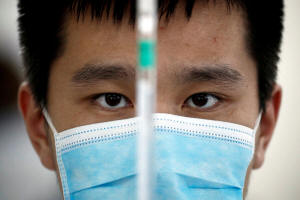Piecemeal data releases threaten to undermine Sinovac's COVID-19 vaccine
 Send a link to a friend
Send a link to a friend
 [December 28, 2020]
BEIJING/SINGAPORE (Reuters) -
Fragmental releases of efficacy data for the COVID-19 vaccine developed
by China's Sinovac could undermine confidence in the shot, experts
warned, as several countries prepare for mass inoculations with the
vaccine. [December 28, 2020]
BEIJING/SINGAPORE (Reuters) -
Fragmental releases of efficacy data for the COVID-19 vaccine developed
by China's Sinovac could undermine confidence in the shot, experts
warned, as several countries prepare for mass inoculations with the
vaccine.
Turkish researchers said on Thursday Sinovac's CoronaVac was 91.25%
effective based on an interim analysis only to see a confusing readout
the same day from Brazil which said the vaccine's efficacy was between
50% and 90%.
Brazil has also delayed release of its efficacy data on the vaccine
three times, as Sinovac seeks to consolidate data from global trials
that include Indonesia, Turkey and Chile.
The efficacy data is closely watched as many developing countries have
signed deals to use the Sinovac vaccine which is easier to store and
transport than rival shots developed by Pfizer and its partner BioNTech
and Moderna.

Experts say it's not unusual for a vaccine to show different efficacy
rates in various settings, as trial protocols, data size and population
could impact results, but the way CoronaVac data has been released
created some confusion.
"You really want the data to be compelling at first presentation; this
is what Pfizer and Moderna achieved, AstraZeneca less so," Jerome Kim,
head of the International Vaccine Institute, a Seoul-based non-profit
agency devoted to research in vaccine.
"With multiple 'leaks' of data and suggestions of this or that you don't
see the same effect with Sinovac; perhaps the final presentation in
January will be more compelling."
Sinovac had no immediate comment.
A Chinese foreign ministry spokesman said on Monday at a daily briefing
that its vaccine developers were pushing forward "in strict adherence to
scientific principles and regulatory requirement".
Four other Chinese vaccines from Sinopharm, CanSino Biologics and the
Chinese Academy of Sciences are in Phase 3 clinical trials.
MORE DATA AND TRANSPARENCY
The Turkish trial data for CoronaVac is based on analysis of 1,322
participants which included 29 infected people, and efficacy evaluations
were made 14 days after the second dose was administered.
Authorities initially planned to announce results when the number of
patients reached 40, but released interim evaluation as the country
looks to grant emergency use authorization.
Indonesia, which is also considering the shot for mass inoculation,
confused the world earlier this month when state-owned Bio Farma said
the vaccine's efficacy was 97%. It later clarified that the prevention
rate could not be determined yet and it was necessary to wait for
complete data.
[to top of second column]
|

A man works in a laboratory of Chinese vaccine maker Sinovac
Biotech, developing an experimental coronavirus disease (COVID-19)
vaccine, during a government-organized media tour in Beijing, China,
Sept. 24, 2020. REUTERS/Thomas Peter

"When you are not able to release sufficient details, it's probably
better not to make your announcement like that," said Paul Griffin,
a professor at the University of Queensland who is also running a
number of COVID-19 vaccine studies.
With efficacy data in Turkey based on just 1,322 subjects and small
infection cases, experts say more data from a larger number of
participants would be needed to seek regulatory approval.
"It's difficult to determine how well (the) Sinovac vaccine works
based solely on 29 coronavirus cases," Kim said.
"It would be good to have more volunteers and more infections, which
would boost the robustness of the efficacy data."
That would make data from Brazil crucial where it has completed a
trial with 13,000 volunteers, while studies in Turkey and Indonesia
involve more than 7,000 and 1,600 respectively.
Some experts warned greater scrutiny on data compilation and
analysis was expected for COVID-19 vaccines developed in China due
to its patchy safety track record.
"This should be analysed very clearly and transparently. And
transparency is one of the biggest concerns for China, especially
with their vaccine and also because of their track record," said
Dicky Budiman, an epidemiologist at Queensland’s Griffith
University.

"So this is one of the very important and crucial times for China to
show the world how they have improved the quality of their
vaccines... This is something they have to explain to the world,
through of course scientific papers."
(Reporting by Beijing Newsroom, Aradhana Aravindan in Singapore,
Stanley Widianto in Jakarta and Kate Lamb in Sydney; Writing by
Miyoung Kim, editing by Emelia Sithole-Matarise)
[© 2020 Thomson Reuters. All rights
reserved.] Copyright 2020 Reuters. All rights reserved. This material may not be published,
broadcast, rewritten or redistributed.
Thompson Reuters is solely responsible for this content. |